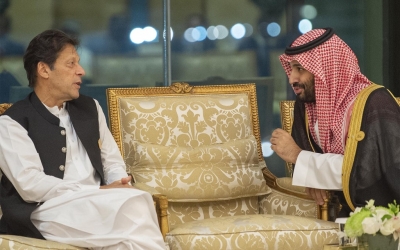Pakistani army chief arrives in Saudi Arabia amid strained ties over Kashmir

Pakistan's army chief arrived in Saudi Arabia on Monday in an effort to diffuse tensions following a disagreement over Riyadh's policy towards Kashmir.
Saudi Arabia's chief of general staff, Major General Fayyad bin Hammad al-Ruwaili, received General Qamar Javed Bajwa in Riyadh, the Saudi ministry of defence said in a statement.
"During their meeting, they discussed prospects of military cooperation and ways to boost it as well as other topics of common interest," the statement read.
Tempers frayed earlier this month when Pakistani Foreign Minister Shah Mahmood Qureshi said Riyadh needed to convene a meeting on the disputed region of Kashmir or Islamabad would seek a meeting of Muslim-majority countries outside of the Organisation of Islamic Cooperation (OIC).
The outburst was seen as a challenge to Saudi Arabia's leadership of the OIC, and angered an ally that is the biggest source of remittances into Pakistan, and among its largest creditors.
Irked by Pakistan's demands, Riyadh forced Islamabad to pay back $1bn of a $3.2bn loan prematurely, and is demanding another $1bn.
While Bajwa's visit was "primarily military-affairs oriented", according to a Pakistani army spokesman, Pakistani military and government officials told Reuters that Bajwa would try to defuse the situation which, if not reversed, could negatively impact Pakistan's central bank foreign reserves.
"I think our case is to convince them that there's no foreign policy shift," a senior Pakistani military official told Reuters.
In December last year, Pakistan withdrew from a Muslim nations' forum in Malaysia at the last minute on the insistence of Riyadh, who saw the gathering as an attempt to challenge its leadership of the OIC.
Middle East Eye delivers independent and unrivalled coverage and analysis of the Middle East, North Africa and beyond. To learn more about republishing this content and the associated fees, please fill out this form. More about MEE can be found here.





